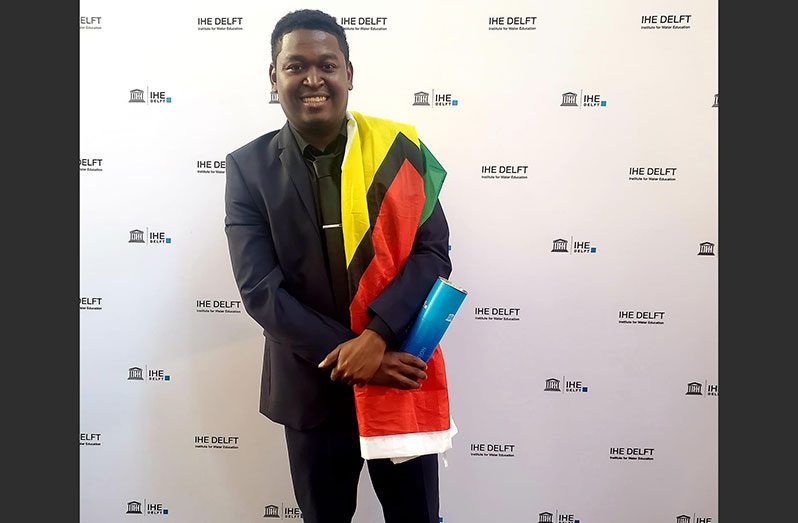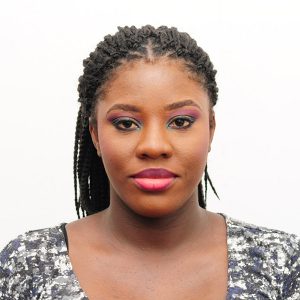FORMER national swimmer, Omali Dare, has completed his Master of Science Degree in Water Management and Governance, and is eager to utilise his knowledge in ways that would contribute to the development of the country.
Dare graduated from the IHE Delft Institute for Water Education- the largest graduate water education facility in the world- which is located in The Netherlands.
The institution is revered as a knowledge centre for water infrastructure, technology and sciences, and attracts high-level students and scientists from around the globe.
Dare was able to attend the institute through a scholarship from the Ministry of Public Service. And based on his agreement, he will work within the public sector for the next three years.
Though he is grateful for completing yet another chapter in his academic journey, the 27-year-old said that his time at IHE was no “walk in the park.”
“I am grateful, but the journey was rough and filled with uncertainties. I am not the same person who I was when I started, I am humbled by how much I don’t know,” the former New Silver City Secondary student shared.
He further commented: “The programme was intense. While it was easy to understand, the amount of information which we were expected to read and assimilate for each module in three weeks was very taxing. After a rough 18 months, I think I want a break to mentally recover from the intense learning process.”
Dare shared that throughout his academic journey he focused on what his achievements would mean for his family, and how he could make them proud.
“I feel like it means more for my family than myself because throughout our generations everybody has made small improvements for a better quality of life, which afforded me this opportunity. For this reason, I am humbled,” Dare said.
He added: “I have never been away from home for so long, so I definitely miss my family and all the associated gatherings. I also came in the midst of the [COVID-19] pandemic when everything was locked and, at the time, Europe’s numbers were astronomical. I contemplated at one point if I should even leave Guyana.”
In an interview with the Guyana Chronicle, Dare shared how he ended up specialising in the study of water, thanks to growing up near a creek in the mining town of Linden, where he would swim daily and his family would use the water for domestic purposes.
His love for water also led to him becoming a national swimmer, representing Guyana at the regional Goodwill Championships for several years.
With a love for water from a very young age, Dare naturally gravitated towards studying the environment and water when he began his university education. In 2017, he graduated from the University of Guyana with his Bachelor of Science Degree in Environmental Studies.
“I decided to study environmental studies because I recognised that there were a number of issues environmentally related and I wanted to add value and contribute to solutions,” he said.
Dare developed a particular interest in studying pollution caused by mining across the country, moreso, after he visited the interior region where he observed, first-hand, the pollution caused by gold mining.
“Visiting several of the indigenous communities, I recognised that they depend heavily on the surrounding rivers and creeks. However, I also noticed that the mining activities have polluted waterways heavily and this can have several negative implications for these communities. I think this is where my interest began,” the graduate said.
FIRST BOOK
Dare’s achievement of his master’s degree comes just a few months after he would’ve published his first book on the use of composting to boost agriculture titled: “The Potential of Composting: A pilot Study Investigating the Potential for Composting in Rural Areas.”
Agriculture and farming is another area where he is hoping to apply his expertise and make an impact in Guyana’s development.
“I think, with my experience in the sector and my newly acquired teachings in water management, hopefully, I will be able to add value and lend my technical expertise with solutions to best reduce pollution in Guyana’s water ways,” Dare said.
The graduate, who is formally attached to the Ministry of Natural Resources as an Environmental Officer, did a thesis which captured: “An assessment of the participation of actors and the regulatory framework for artisanal and small scale gold mining in the Mazaruni River Basin, Guyana.”
“I chose the thesis because I wanted to investigate an issue that is related to the mining sector and that I can use in the future. The legal regulatory framework that exists in Guyana to manage the artisanal sector, while most of it is consistent with international standards, guidelines and best practices, there are still several gaps and challenges,” Dare said
Although Guyana is a signatory to the Minamata Convention, which seeks to eradicate the use mercury in the mining sector, there is room for capacity building in order to sufficiently implement the guidelines of the convention.
Dare hopes that his new-found knowledge would allow him to contribute efficiently to Guyana’s development in this area.



.jpg)








